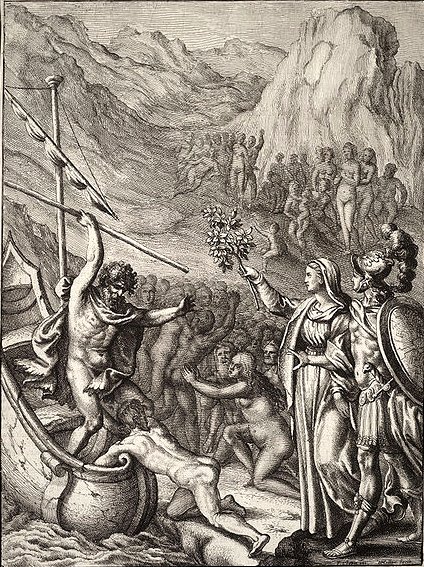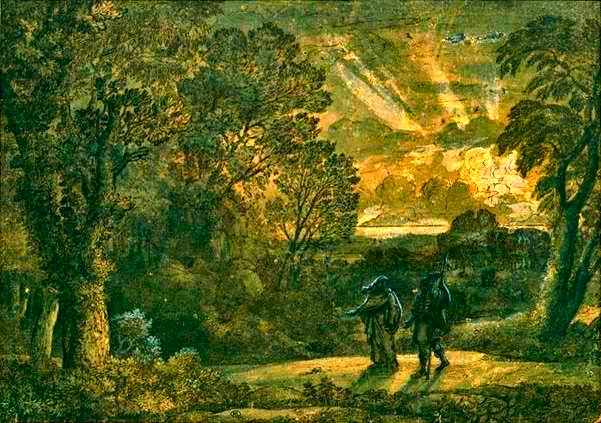The Golden Bough (mythology) on:
[Wikipedia]
[Google]
[Amazon]
 The Golden Bough is one of the episodic tales written in the epic ''
The Golden Bough is one of the episodic tales written in the epic ''
 Before entering the
Before entering the  Anchises, the father of Aeneas, is finally located in the green and sunny Elysium, where the beautiful river Eridanus flows. Aeneas attempts three times to hug his father, but has no success as his father's shade is like thin air, or empty dreams.
In spite of this, they have a happy encounter and Anchises tells his son about the nearby river
Anchises, the father of Aeneas, is finally located in the green and sunny Elysium, where the beautiful river Eridanus flows. Aeneas attempts three times to hug his father, but has no success as his father's shade is like thin air, or empty dreams.
In spite of this, they have a happy encounter and Anchises tells his son about the nearby river
 The Golden Bough is one of the episodic tales written in the epic ''
The Golden Bough is one of the episodic tales written in the epic ''Aeneid
The ''Aeneid'' ( ; la, Aen─ō╠åis or ) is a Latin epic poem, written by Virgil between 29 and 19 BC, that tells the legendary story of Aeneas, a Trojan who fled the fall of Troy and travelled to Italy, where he became the ancestor of th ...
'', book VI, by the Roman poet Virgil
Publius Vergilius Maro (; traditional dates 15 October 7021 September 19 BC), usually called Virgil or Vergil ( ) in English, was an ancient Roman poet of the Augustan period. He composed three of the most famous poems in Latin literature: th ...
(70ŌĆō19 BC), which narrates the adventures of the Trojan hero Aeneas
In Greco-Roman mythology, Aeneas (, ; from ) was a Trojan hero, the son of the Trojan prince Anchises and the Greek goddess Aphrodite (equivalent to the Roman Venus). His father was a first cousin of King Priam of Troy (both being grandsons ...
after the Trojan War
In Greek mythology, the Trojan War was waged against the city of Troy by the Achaeans (Greeks) after Paris of Troy took Helen from her husband Menelaus, king of Sparta. The war is one of the most important events in Greek mythology and ...
.Stookey, Lorena Laura (2004); p. 67.
Story
WhileTroy
Troy ( el, ╬żŽü╬┐╬»╬▒ and Latin: Troia, Hittite: Æŗ½ÆŖÆÆä┐ÆŖŁ ''Truwi┼Īa'') or Ilion ( el, ╬Ŗ╬╗╬╣╬┐╬Į and Latin: Ilium, Hittite: ÆāŠÆć╗ÆŖŁ ''Wilu┼Īa'') was an ancient city located at Hisarlik in present-day Turkey, south-west of ├ć ...
was being destroyed in its last battle against the Greeks, Aeneas leaves the city and leads a quest to find a new homeland in the western Mediterranean. In this mission, guided by the prophet Helenus
In Greek mythology, Helenus (; grc, ß╝Ø╬╗╬Ą╬Į╬┐Žé, ''Helenos'', la, Helenus) was a gentle and clever seer. He was also a Trojan prince as the son of King Priam and Queen Hecuba of Troy, and the twin brother of the prophetess Cassandra. He was al ...
, Aeneas arrives in Italy where he intends to found a city for his people. Once there, Deiphobe, the Sibyl
The sibyls (, singular ) were prophetesses or oracles in Ancient Greece.
The sibyls prophesied at holy sites.
A sibyl at Delphi has been dated to as early as the eleventh century BC by PausaniasPausanias 10.12.1 when he described local tradi ...
of Cumae
Cumae ( grc, ╬ÜŽŹ╬╝╬Ę, (Kum─ō) or or ; it, Cuma) was the first ancient Greek colony on the mainland of Italy, founded by settlers from Euboea in the 8th century BC and soon becoming one of the strongest colonies. It later became a rich Ro ...
, then an old woman over seven hundred years old, at the Temple of Apollo
Apollo, grc, ß╝łŽĆŽī╬╗╬╗Žē╬Į╬┐Žé, Ap├│ll┼Źnos, label=genitive , ; , grc-dor, ß╝łŽĆ╬Ł╬╗╬╗Žē╬Į, Ap├®ll┼Źn, ; grc, ß╝łŽĆ╬Ą╬»╬╗Žē╬Į, Ape├Łl┼Źn, label= Arcadocypriot Greek, ; grc-aeo, ß╝īŽĆ╬╗╬┐Žģ╬Į, ├üploun, la, Apoll┼Ź, la, Apollinis, label ...
, consents to escort him on a journey into the underworld to comply with his wish to see the shade of his deceased father.
 Before entering the
Before entering the underworld
The underworld, also known as the netherworld or hell, is the supernatural world of the dead in various religious traditions and myths, located below the world of the living. Chthonic is the technical adjective for things of the underwor ...
, Deiphobe tells Aeneas he must first bury the musician Misenus
In Greek and Roman mythology, Misenus (╬£╬╣Žā╬Ę╬ĮŽīŽé) was a name attributed to two individuals.
* Misenus was a friend of Odysseus.
* Misenus was a character in Virgil's epic poem the ''Aeneid''. He was a brother-in-arms of Hector and, after Hec ...
, and also obtain the bough of gold which grows nearby in the woods around her cave, which must be given as a gift to Proserpina
Proserpina ( , ) or Proserpine ( ) is an ancient Roman goddess whose iconography, functions and myths are virtually identical to those of Greek Persephone. Proserpina replaced or was combined with the ancient Roman fertility goddess Libera, whose ...
, the queen of Pluto
Pluto (minor-planet designation: 134340 Pluto) is a dwarf planet in the Kuiper belt, a ring of bodies beyond the orbit of Neptune. It is the ninth-largest and tenth-most-massive known object to directly orbit the Sun. It is the largest ...
, king of the underworld. In the woods, Aeneas's mother, the goddess Venus
Venus is the second planet from the Sun. It is sometimes called Earth's "sister" or "twin" planet as it is almost as large and has a similar composition. As an interior planet to Earth, Venus (like Mercury) appears in Earth's sky never f ...
, sends two doves to aid him in this difficult task, and these help him to find the tree. When Aeneas tears off the bough, a second golden one immediately springs up, which is a good omen, as the sibyl had said that if this did not happen the coming endeavor would fail.
The Trojans, led by Corynaeus, carry out the funerary rites for Misenus, allowing Aeneas to start his descent into the Underworld. The Sibyl shows the golden bough to Charon who only then allows them to enter his boat and cross the Stygian river. On the other side, she casts a drugged cake to the three-headed watchdog Cerberus
In Greek mythology, Cerberus (; grc-gre, ╬Ü╬ŁŽü╬▓╬ĄŽü╬┐Žé ''K├®rberos'' ), often referred to as the hound of Hades, is a multi-headed dog that guards the gates of the Underworld to prevent the dead from leaving. He was the offspring of the ...
, who swallows it and falls asleep. Once in the Underworld, Aeneas tries talking to some shades, and listens to the Sibyl speak of places, like Tartarus
In Greek mythology, Tartarus (; grc, , }) is the deep abyss that is used as a dungeon of torment and suffering for the wicked and as the prison for the Titans. Tartarus is the place where, according to Plato's ''Gorgias'' (), souls are judg ...
, where he sees a large prison, fenced by a triple wall, with wicked men being punished, and bordered by the fiery river Phlegethon
In Greek mythology, the river Phlegethon ( ╬”╬╗╬Ą╬│╬Ł╬ĖŽē╬Į, English translation: "flaming") or Pyriphlegethon (╬ĀŽģŽü╬╣Žå╬╗╬Ą╬│╬Ł╬ĖŽē╬Į, English translation: "fire-flaming") was one of the five rivers in the infernal regions of the underworld, ...
. At Pluto's palace, Aeneas puts the golden bough on the arched door, and goes through to the Elysian Fields, the abode of those who led just and useful lives.
 Anchises, the father of Aeneas, is finally located in the green and sunny Elysium, where the beautiful river Eridanus flows. Aeneas attempts three times to hug his father, but has no success as his father's shade is like thin air, or empty dreams.
In spite of this, they have a happy encounter and Anchises tells his son about the nearby river
Anchises, the father of Aeneas, is finally located in the green and sunny Elysium, where the beautiful river Eridanus flows. Aeneas attempts three times to hug his father, but has no success as his father's shade is like thin air, or empty dreams.
In spite of this, they have a happy encounter and Anchises tells his son about the nearby river Lethe
In Greek mythology, Lethe (; Ancient Greek: ''LßĖŚth─ō''; , ), also referred to as Lemosyne, was one of the five rivers of the underworld of Hades. Also known as the ''Ameles potamos'' (river of unmindfulness), the Lethe flowed around the cav ...
, the river of forgetfulness, on the other side of which were a multitude of spirits waiting to be born on Earth. Over there were those who would be the descendants of Aeneas, and those who would live in the future Roman Empire
The Roman Empire ( la, Imperium Romanum ; grc-gre, ╬Æ╬▒Žā╬╣╬╗╬Ą╬»╬▒ Žäß┐Č╬Į ß┐¼Žē╬╝╬▒╬»Žē╬Į, Basile├Ła t├┤n Rh┼Źma├Ł┼Źn) was the post- Republican period of ancient Rome. As a polity, it included large territorial holdings around the Mediter ...
, such as Romulus, Camillus, Marcellus, and the Caesars. Anchises gives advice to Aeneas, and then leads him to the ivory gate, one of the gates of "Sleep", by which they return to Earth.Clarke, Michael (2007); pp. 48-49.
See also
*Dido
Dido ( ; , ), also known as Elissa ( , ), was the legendary founder and first queen of the Phoenician city-state of Carthage (located in modern Tunisia), in 814 BC.
In most accounts, she was the queen of the Phoenician city-state of Tyre (t ...
*''Orpheus in the Underworld
''Orpheus in the Underworld'' and ''Orpheus in Hell'' are English names for (), a comic opera with music by Jacques Offenbach and words by Hector Cr├®mieux and Ludovic Hal├®vy. It was first performed as a two-act " op├®ra bouffon" at the Th├®├ ...
''
* ''The Golden Bough'' (book)
Footnotes
References
* * * {{DEFAULTSORT:Golden Bough, The Characters in Book VI of the Aeneid Roman mythology Ancient Greek priestesses Sibyls